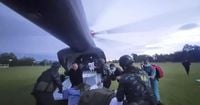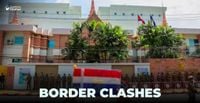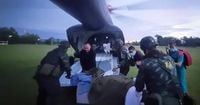In a dramatic escalation of a long-simmering border dispute, Thailand and Cambodia have plunged deeper into conflict following a series of landmine explosions and deadly armed clashes along their shared frontier. The latest developments have seen Thailand close multiple border checkpoints, expel Cambodia's ambassador, recall its own envoy, and impose sweeping restrictions on cross-border movement and trade, while Cambodia has responded by downgrading diplomatic ties and recalling its embassy staff from Bangkok.
The tensions trace back to May 28, 2025, when a violent exchange of fire between troops near the disputed border claimed the life of a Cambodian soldier. Since then, both countries have engaged in a tit-for-tat political and military standoff, with each accusing the other of provocations and violations of sovereignty.
On July 23, 2025, the situation worsened dramatically when a landmine exploded near the border in Thailand's Ubon Ratchathani province, severely injuring five Thai soldiers, one of whom lost a leg. This incident followed another landmine blast just a week earlier on July 16, which also wounded Thai soldiers and resulted in one losing a foot. Thailand's military and government have accused Cambodia of planting new landmines in the disputed territory, a claim Phnom Penh vehemently denies.
Acting Thai Prime Minister Phumtham Wechayachai stated, "Thai military investigations indicated Cambodia had planted new landmines in contested territory," and announced the closure of all border checkpoints under the jurisdiction of Thailand's Second Army. Lt Gen Boonsin Phadklang, commander of the 2nd Army Region, signed an order on July 23 to close border crossings and suspend all tourism activities in affected areas, including the Ta Muen Thom and Ta Kwai temples, both located in disputed and undemarcated zones.
The commander emphasized that these measures aim to protect Thailand's sovereignty and territorial integrity, safeguard citizens, and prevent further incidents. He described the landmine attacks as "a severe threat to peace and stability along the border between the two nations," and noted that the mines discovered were Russian-made, not used by the Thai military, suggesting recent deployment.
In response, Cambodia's Defence Ministry spokesperson, Lt. Gen. Maly Socheata, dismissed the allegations as "baseless accusations," asserting that the border area "still contains landmines left over from past wars that have not yet been fully cleared." She accused Thailand of violating a 2000 agreement regarding agreed patrol paths and accused Bangkok of shifting blame for the ongoing tensions.
The diplomatic fallout has been swift. Thailand expelled Cambodia's ambassador and recalled its own envoy from Phnom Penh on July 23, while Cambodia downgraded diplomatic relations to their lowest level and demanded all Thai diplomatic staff leave Cambodia. Both countries have imposed trade restrictions; Cambodia has banned Thai movies and TV shows, stopped importing Thai fruits and vegetables, boycotted certain internet links and power supplies, and ceased fuel imports from Thailand.
The border dispute centers on the Emerald Triangle, where Thailand, Cambodia, and Laos converge, with overlapping claims to territory based on colonial-era maps. The area has long been a flashpoint, with the last serious clashes occurring between 2008 and 2011, resulting in at least 34 deaths and thousands displaced.
On July 24, 2025, armed clashes erupted again, marking the most deadly confrontation in over a decade. Thai officials reported that 13 civilians and one Thai soldier were killed in rocket and artillery attacks by Cambodian forces, with 14 soldiers and 32 civilians injured. Thailand's health minister, Somsak Thepsuthin, condemned the shelling of a hospital in Surin province as a war crime. Fighting spread across six locations in three provinces near the Khmer Hindu temple Ta Muen Thom, a disputed site that has seen repeated violence.
The Thai military accused Cambodian troops of opening fire first, deploying surveillance drones, and sending troops equipped with heavy weapons including rocket launchers. Cambodia denied these claims, asserting that Thai forces launched the initial assault and that Cambodian troops were acting in self-defense against an unprovoked incursion.
Former Cambodian premier Hun Sen, father of current Prime Minister Hun Manet, confirmed that two Cambodian provinces had come under shelling from Thai forces. Prime Minister Hun Manet declared, "Cambodia has always taken a stand to solve problems peacefully, but in this case we have no choice but to respond with armed forces against armed aggression." The Cambodian government also announced plans to reinstate conscription to bolster its military amid the heightened tensions.
The conflict has drawn international concern. China expressed deep worry and pledged to promote peace and dialogue, while Malaysia's Prime Minister Anwar Ibrahim, representing ASEAN, urged both nations to stand down and seek a peaceful resolution.
The crisis has also triggered political reverberations within Thailand. Prime Minister Paetongtarn Shinawatra was suspended on July 1 pending an ethics investigation related to her handling of the border dispute, following the leak of a phone call with Cambodia's former leader Hun Sen. Critics accused her of compromising Thai interests, though she maintained she sought to defuse tensions.
As the situation stands, the border areas under Thailand's Second Army remain closed to all vehicle and pedestrian traffic, with a strict ban on tourism and trade. Both sides continue to accuse each other of violations and provocations, with no immediate end in sight to the hostilities that threaten the fragile peace in this historically contested region.
With casualties mounting and diplomatic ties fraying, the Thailand-Cambodia border dispute has once again become a volatile flashpoint in Southeast Asia, underscoring the enduring challenges of resolving territorial conflicts rooted in history and nationalism.



